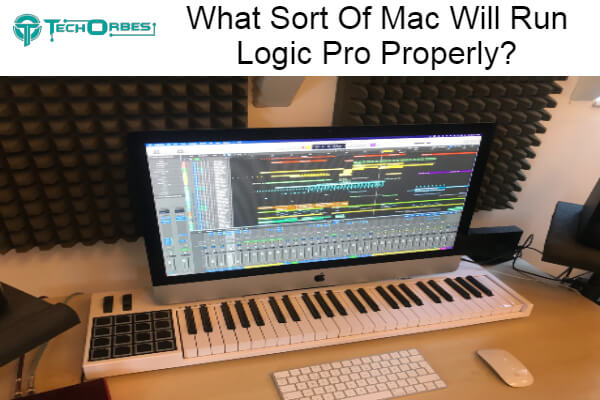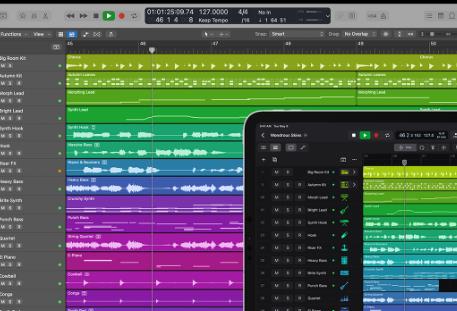What Sort Of Mac Will Run Logic Pro Properly? Expert Answer
I hope you will get all the information from reading below about What Sort Of Mac Will Run Logic Pro Properly? Apple has produced several additional Apple Silicon-based gadgets since the release of macOS Monterey a few months ago.
Increased memory size is one of the new upgraded M1-Pro and Max chips’ capabilities, which alleviates some of the concerns customers had about buying them for pro audio and video jobs. There is a slew of YouTube videos comparing the performance of MI-based devices to Intel-based units, and the M1-Pro and Max-based systems are unbeatable.
However, there are still some compatibility concerns. Only Big Sur and Monterey have supported macOS versions as of February 2022. To begin, check if one of these versions is compatible with your Mac.
For added future-proofing, the most recent version is preferred. I’m using Monterey right now, and it’s only broken a couple of less-used audio plug-ins. Just in case, I saved a copy of my Big Sur system.
What Sort Of Mac Will Run Logic Pro Properly?
The general view appears that getting an M1-based Mac now is fine (there are still a few incompatibilities) but that it will likely get better and more compatible in the future.

Whatever Mac Model You Have Or Want, Focus On Three Things
CPU type, speed, storage, and core count. It’s an Intel-based machine if you’re not just looking for a fast M1-based Mac (which, to be honest, I’d go for right now).
CPU Cores And Type
There are several model kinds available, but for pro audio, you’ll want as many CPU cores as possible, at least four. Avoid dual-processor Intel i5s because they don’t always support hyper-threading (virtual cores). NB: Some newer i5 laptop models do. Other Intel CPU models feature two virtual cores for each real core, giving you eight virtual cores if you have four real cores.
Multi-threading enhances processing efficiency (e.g., running application processes in parallel). Although CPU speed does make a difference, it is not as significant as it once was. If you must choose between the two, go with the more cores as well as the slower maximum speed.
Size of storage (also known as hard drive/SSD); This should be plenty for most new models, as upgrading later is increasingly difficult. I wouldn’t go below 1TB right now. If you use large sample libraries, etc., 2TB is much better.
I use Logic and Ableton Live, and their factory libraries’ total size is about 200GB. It’s also worth noting that SSD wear is reduced on larger drives so that they can live longer.
Speed (RAM)
Recall (aka RAM). Apps, sample libraries, and other programs are loaded into RAM when you run them. As you switch between threads, programs, or documents, data is swapped out to Storage/Hard Drive when your RAM runs out of capacity.
It happens all the time since the OS tries to maintain the RAM full, but if it happens frequently enough, your computer will struggle and become slow. This is also why switching from a slow hard drive to a fast SSD can make a significant difference.
Regarding memory, 16GB is the bare minimum, with 32GB or more optimal for those using huge symphonic sample libraries. Composers have been known to use Mac Pros with dual 12-core Xeon processors and 384GB of RAM. It’s mainly fine for me to use 16GB with numerous example libraries loaded.
Storage
Please don’t get the two terms Storage and Memory mixed up, even though they look similar and are becoming increasingly merged within Apple Silicon systems. In other words, unless your hard drive/SSD is nearly full, don’t start deleting files and plugins from your storage system if you hear warning messages about memory running out.
So, if you don’t already have one, which model kind should you get? The performance you want and where/how you’ll use it will determine whether you acquire an iMac, Mac Mini, Mac Book Pro, or Mac Pro.
What should I look for in a Mac to efficiently use Logic Pro X?
To efficiently use Logic Pro X on a Mac, consider the following factors when choosing your Mac model and specifications:

- Processor (CPU): Opt for a powerful processor with multiple cores, such as an Intel Core i7 or an Apple M1 chip. Logic Pro X benefits from strong multi-core performance.
- RAM: Choose at least 16GB of RAM for smooth multitasking, especially with large projects and virtual instruments. 32GB or more is ideal for complex compositions.
- Storage: Prioritize a fast SSD with ample storage capacity. SSDs improve project load times and overall performance.
- Graphics: While not a top priority for music production, a good GPU can help if you’re also working with video or visual elements.
- Display Quality: A high-resolution Retina display provides better clarity when editing waveforms and visual elements.
- Ports: Ensure the Mac has sufficient USB, Thunderbolt, and audio ports for your peripherals, audio interfaces, and MIDI controllers.
- Operating System: macOS is optimized for Logic Pro X and offers a seamless experience.
- Software Compatibility: Ensure your plugins, virtual instruments, and external hardware are compatible with the Mac and Logic Pro X.
- Budget: Balance your needs with your budget. Prioritize RAM and CPU power over other features for music production.
- Battery Life: If you’re working on the go, consider a MacBook with longer battery life for uninterrupted sessions.
- Audio Quality: MacBook Pro models often offer improved audio components, useful for monitoring and recording.
- Portability: Choose between the power of MacBook Pro and the portability of MacBook Air based on your preferences.
- Reviews and Benchmarks: Research user reviews and performance benchmarks to ensure the chosen Mac meets your expectations.
- Future-Proofing: Opt for a Mac that will accommodate your music production needs for the next few years without becoming outdated quickly.
By aligning these factors with your specific music production workflow, you’ll have a Mac that efficiently runs Logic Pro X and enhances your creative process.
Conclusion
To sum up What Sort Of Mac Will Run Logic Pro Properly? If you plan to perform live or travel often, a laptop is really useful, but you should max out the capabilities as much as you can and have lots of storage. A small screen is fine if you utilize an external monitor, but 15 or larger is recommended for live use.
Mac Book Pro hardware has more connectors than Mac Book or MB Air. Expensive, but you’ll never want to be without one. I’d choose an Apple 16″ MBP M1-Pro with a 10-core CPU, 16-core GPU, 16-core Neural Engine, 32 GB Unified Memory, and 1TB storage.
16-inch variants run cooler. But that’s just me after seeing many audio videos. IMacs are good home computers since they have a built-in screen and some models are upgradable. Choose the screen size and specs for the above goods.
The Mac Mini is an excellent value if you already have a good screen (I have the 6-core Intel model). Without a dedicated graphics card/chip, these suffer from large monitors and graphics-heavy software. When running huge Logic sessions, I experience graphical corruption after a while.
My studio needs a new M1-Pro-based model. The consensus seems to be that it’s fine to buy an M1-based Mac now (despite some remaining incompatibilities), with the expectation that things will improve and become more compatible shortly.
Frequently Asked Questions
What version of macOS is required for Logic Pro?
You’ll need a modern Mac running macOS 11.0 or later and 6GB of free space for the base package to get started with Logic Pro 10.7. You’ll need 72GB to install everything, including the bundled synths, instruments, loops, and effects.
How much RAM does Logic Pro require?
RAM is 4 GB. A graphics card that supports OpenCL or Intel HD Graphics 3000 or later VRAM is 256MB.
Which MacBook is best for making music?
Due to power, performance, and durability, the Apple Silicon M1 MacBook Pro is by far the greatest Mac for music creation. The MacBook Pro is a powerful and portable music production studio capable of professional-level music creation on a Mac.
Is it possible for my Mac to execute logic?
Any audio interface compatible with your macOS version will function with Logic Pro. Check to determine if a driver is provided with the device or if one can be obtained from the manufacturer if the device requires one.
Is Logic pro compatible with a 256GB SSD?
The 256GB storage capacity is sufficient for Windows and other important software. However, you may require additional storage if you work with large data files, such as video, sound, or photographs, or large datasets for machine learning.

Rayssa is a native American. A group of specialized individuals raised her with a passion for gaming. Here she discovered that computer games can expand your creative mind to infinite possibilities. In recent years, she has gone beyond gaming as a means of entertainment to enjoy it as a passio
